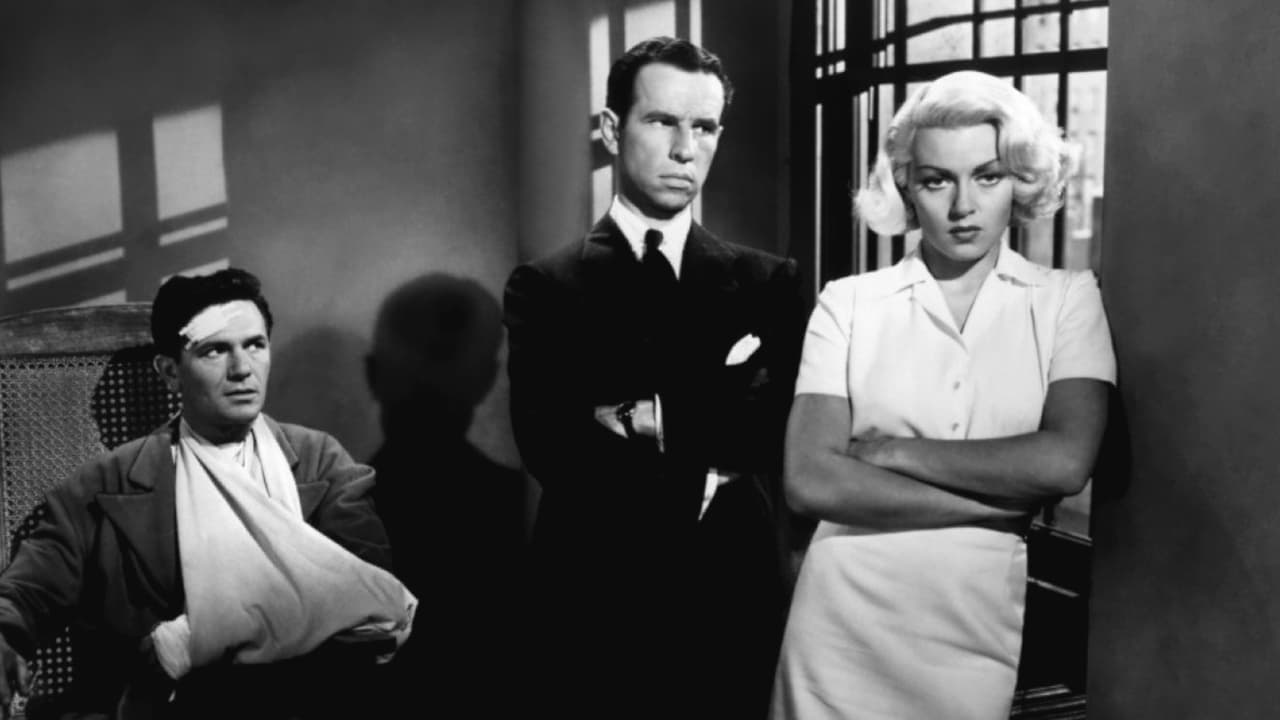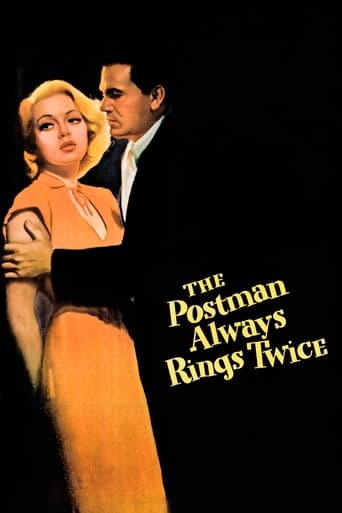

I like the storyline of this show,it attract me so much
... View MoreSERIOUSLY. This is what the crap Hollywood still puts out?
... View MoreI really wanted to like this movie. I feel terribly cynical trashing it, and that's why I'm giving it a middling 5. Actually, I'm giving it a 5 because there were some superb performances.
... View MoreGreat example of an old-fashioned, pure-at-heart escapist event movie that doesn't pretend to be anything that it's not and has boat loads of fun being its own ludicrous self.
... View MoreThe only part of the movie I enjoyed at all was the Nick Smith character played by Cecil Kellaway. The plot was boring. The characters Frank Chambers and Cora Smith were boring. I kept checking the clock, hoping that the movie was almost over.
... View MoreI know that I'm not supposed to ask questions, and I know it was 1946, and Hollywood was playing with Film Noir, but there was just too much about this movie that made me want to yell "STOP ALREADY!!!"Yes, Lana Turner is absolutely breathtaking. She's so sexy in all of those white outfits, and those beautiful eyes and lips. Very sensuous.But do they really expect someone like her to fall for Cecil Kellaway and try to make it believable for the audience? And I'm sorry, but I just never thought that John Garfield was ever that good.Throughout watching this film all I could think of was how it reminded me of "Double Indemnity" (which in my opinion is a much better film, in every aspect).And the moral of the story about the postman? Ridiculous.Don't waste your time with this one, no matter what you read about it.
... View MorePlot—A penniless drifter stops by a roadside diner, and takes a job there after getting a load of the owner's sexy wife. Their relationship grows, while the middle-aged husband suspects nothing. Eventually, the two run away together, only to have the wife suddenly return, unable to leave the comforts of a successful business. But the two are unable to stay apart causing the drifter to return. Finally, the lovers decide to fake an accident killing the inconvenient husband. That way they can be together with all the comforts of the popular diner. That is, if things work out according to plan.Postman is indeed first-rate noir, a genuine classic. Both Turner and Garfield deserved at least Oscar nomination, along with the shifty-eyed Hume Cronyn in a supporting role. In fact their casting was really inspired. Apparently, the chemistry between the two leads smoldered off- screen (IMDB) as well as on.In her angelic white outfits (a wardrobe note of irony), Turner's spider woman reaches iconic status. In fact, I can't help noting her darn near perfect complexion throughout, smooth as silk and a perfect mask. Garfield's streetwise drifter, Chambers, is also superbly realized. Probably, Chambers should have followed his instincts instead of his libido after that first iconic meeting. For it turns out that it is Cora who can't give up the seductions of a comfortable life-style even for his love. It also turns out that neither lover has murder in his or her heart, but together they're trapped. She's trapped by desire for comfort and his smarts; he's struck blind by desire for her short shorts. I guess their mutual attraction is what the French might call "amour fou" (crazy love). In this case, however, love doesn't conquer all until it's too late. Perhaps then it is fate that their long, crooked path should end in tragedy.At the same time, I doubt the legal profession was very happy with the movie's behind-the- scenes legal maneuvering. Cora's attorney Keats (Cronyn) manages to manipulate the law and DA Sackett (Ames) into freeing her, despite her guilt. In short, guilt and innocence is shown as secondary to bargaining outside the courtroom between attorneys. Juries, it seems, don't really matter. All in all, I take the movie's last scenes as a sop to the censors. In fact, the screenplay pushes the 1940's envelope with infidelity, wedlock pregnancy, and Turner's unabashed allure. So some kind of righteous redress was, I guess, required by the watchdogs. Still, the sexual subtext is too strong to override with a last minute gesture to convention. It's probably also relevant that a symbolic swim in the cleansing ocean should prepare the couple for what amounts to after-life redemption. While In that same memorable scene, Cora confesses her sins, even as she struggles atop a black sea of eternity. Thus the powerful symbolism of that dark sea and the plot's underlying fatalism are compromised by what amounts to a last minute appeal to religious convention.I do have a couple gripes. Are we really expected to believe that Cora's middle-aged husband and diner owner, Nick (Kellaway), suspects nothing between his sexy wife and the studly Chambers. And that's even after he stumbles on them in suggestive settings. Now, I'm willing to suspend disbelief during a movie, but only up to a point. In a serious film like this, the point was quickly and unhappily surpassed. Some hint that maybe Nick knows, but puts up with it for bigger reasons, would have helped. The other gripe is a minor one but worth mentioning in a quality film. And that's how easily Chambers beats up the burly Kennedy. Come on director Garnett, that's about as plausible as barroom brawl in a kid's matinée.All in all, Postman's a true noir classic, one of the few to justify a two-hour runtime. Too bad the film and its stars were overlooked Oscar-wise. But then, I guess the lurid content upset too many important people. But it's still a good gripping film to catch up with, that is, if you haven't already.
... View MoreLana Turner and John Garfield generate quite a bit of heat in this screen adaptation of the 1934 James M. Cain novel.The material is pretty racy stuff for a 1940s audience, which explains why it took over a decade for Hollywood to muster the guts to make it into a film. I already knew John Garfield was a good actor, but I was most impressed with Turner. I'd never given her much credit, always thinking of her as more of a bombshell than an actress, but she's terrific in this.As noirs go it's probably not going to go down as one of my favorites. It's too big-budget, too glossy, too studio for me. I prefer my noirs low-budget and gritty, the ones where it looks like the filmmakers could barely afford the film the movie is printed on. But it's a very good movie in its own right, a faithful and worthy interpretation of Cain's book.Grade: A-
... View More